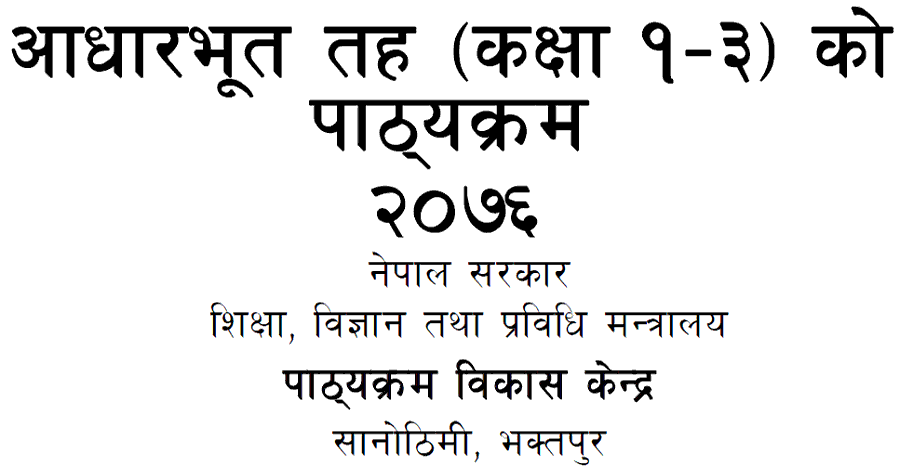
Syllabus for Compulsory Subjects from Grade One to Three 2076
Government of Nepal, Ministry of Education, Science, and Technology, Curriculum Development Center, Sanothimi, Bhaktapur has published the new curriculum of Basic level Grade 1-3.
Download Syllabus of Grade 1 to 3:
Syllabus for Compulsory Subjects from Grade One to Three 2076 .pdf
The task of refining the curriculum has been initiated with the aim of making school level education more purposeful, practical, timely and relevant. In this regard, including timely modifications to the curriculum implemented in 2049 for school level classes 1-3, in view of the feedback and suggestions received from teachers, parents, students, and experts, development, and change in knowledge, science and technology, and balance between local needs and global context. Modify the Primary Education Curriculum 2063 for implementation. This syllabus of Classes 1-3 is developed under the basic level as it seems necessary.
In order to develop the curriculum of school education, the basic level of curriculum 1-3 has been developed in order to develop the curriculum of school education, based on the principles and format specified in the National Curriculum Framework, 2076 for the development of school education courses for the Federal Democratic Republic of Nepal. This curriculum is based on a school education guide prepared by the National Curriculum Framework, 2076, with the goal of supporting children's holistic development, promoting social justice and developing competent and competitive citizens for nation-building, in line with the latest educational changes in the world and the current context and local needs of Nepal. Has been developed
The curriculum has been developed in a unified format with the aim of conducting the learning facilitation process by making interdisciplinary topics relevant to life. International practice and Nepal's experience, Nepal's teaching-learning practices, teacher availability and preparation, professional development, and other contexts, including social studies, science, and the environment, health and physical education and creative arts, are integrated into our field of curriculum as interdisciplinary curriculum, but in the overall structure of the curriculum. Our Serifero, Mathematics, n Phir language, English language, and multidisciplinary scope include an integrated curriculum framework that has been prepared. Similarly, the practical skills required for students in grades 1-3 are integrated into all the areas and classes as needed. The responsibility of selecting and developing the mother tongue / local subject curriculum included in classes 1-3 will be the responsibility of the respective local level.
For the purpose of examining the suggestions received from various subject committees in the draft developed through various workshops conducted with the participation of teachers, experts and experts. No. This syllabus of the integrated structure of Classes 1-3, prepared in 2075, will be tested in Class 1 in the academic year 2076, and based on the feedback received from the test, it will be implemented in all schools in Nepal. It was approved by the Development and Evaluation Council. It outlines the context and justification of curriculum modification, the process of curriculum development and refinement, the principles adopted in curriculum development, and the curriculum development process of integrated structure.
Likewise, the curriculum includes the national objectives of education, the level structure of school education, the curriculum structure of school education, the level competence of basic education (Classes 1-3), the thematic curriculum of the basic level (classes 1-3), the practical skills to be integrated into the integrated curriculum, and the overall curriculum. Structure is included. It also includes learning facilitation methods and procedures, student assessment, medium language selection, curriculum implementation planning and curriculum evaluation, modification and improvement.


